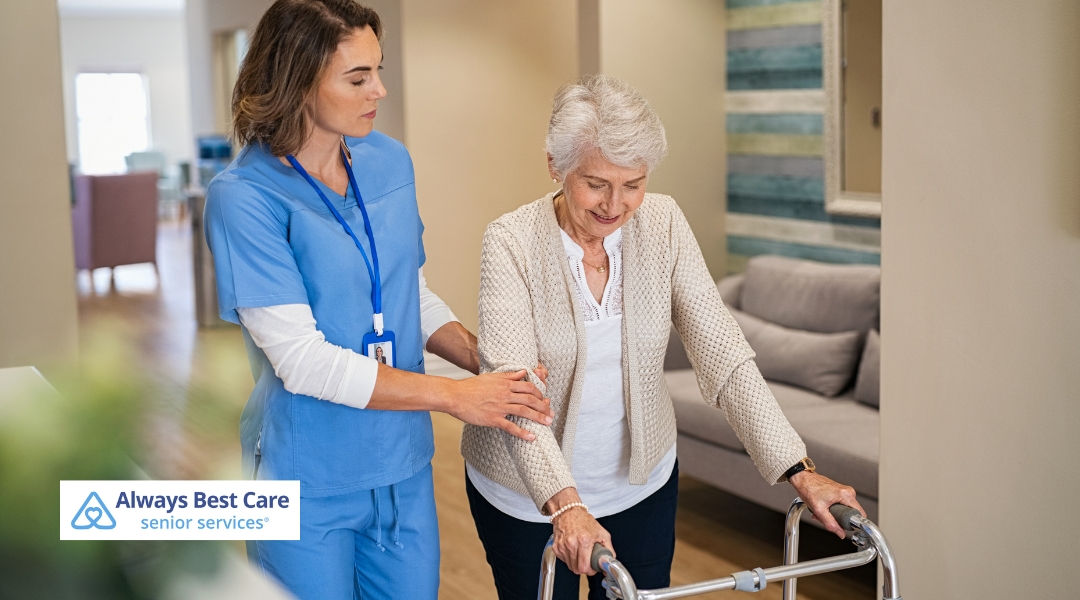Ways to Ease Parents into Accepting Home Care Assistance

Talking to aging parents about accepting in-home assistance can be delicate.
Many seniors worry that needing help will remove their independence or change their routines.
At Always Best Care of Oakville, we know how challenging these conversations can be, but with patience and understanding, it’s possible to help parents see how in-home assistance can improve their quality of life while keeping them comfortable and secure.
Table of Contents
Recognizing the Signs That Help is Needed
Noticing the need for in-home assistance often begins with observing small daily routines or habit changes. These subtle shifts indicate that a parent could benefit from extra support.
Here are some common signs to look for:
- Changes in Meal Preparation
If meals are skipped, consist of unhealthy options, or preparation tools are left out and unused, it might signal that cooking has become too difficult or exhausting. Seniors may lose interest in eating altogether if it feels like too much effort. - Decline in Housekeeping
A once tidy home becoming cluttered or dirty could mean tasks like vacuuming, laundry, or washing dishes have become too physically demanding. Difficulty managing chores can quickly lead to an unsafe or stressful living environment. - Mobility Challenges
Struggles with walking, climbing stairs, or getting in and out of chairs indicate that some physical assistance is needed. Mobility difficulties can increase the risk of falls, making early intervention crucial. - Forgetfulness or Confusion
Missing appointments, forgetting to pay bills, or losing track of personal items could indicate cognitive changes. These can also extend to forgetting to take medications or mixing up dosages, which can have serious consequences. - Signs of Loneliness or Isolation
A lack of interest in social activities, withdrawal from family conversations, or signs of sadness might indicate loneliness. Emotional well-being is as important as physical health; companionship can make a big difference. - Personal Hygiene Decline
Neglecting bathing, grooming, or changing clothes regularly might suggest that these tasks have become physically challenging or that motivation is waning due to emotional struggles. - Difficulty Managing Finances
Unpaid bills, overdrawn accounts, or unopened mail can show that managing finances has become overwhelming. This is often one of the first signs of cognitive changes or stress. - Physical Wear and Tear
Unexplained bruises, cuts, or injuries may indicate difficulty navigating the home safely or completing daily tasks. These could be signs of falls or minor accidents that shouldn’t be ignored. - Changes in Mood or Behavior
Uncharacteristic irritability, mood swings, or confusion may indicate underlying stress, depression, or health issues. Behavioural changes are often a call for support, even if unspoken.
The Importance of a Healthy Diet
Good nutrition is one of the simplest ways to support a happier and healthier lifestyle.
As parents age, preparing balanced meals can become difficult, especially if they manage multiple dietary needs or struggle with kitchen mobility. Having in-home assistance ensures that mealtime stays consistent and nutritious.
The Benefits of Caregiver Companionship
Loneliness can affect anyone, but for seniors, it can profoundly impact their emotional and physical well-being. Caregiver companionship offers more than just assistance with daily tasks—it provides meaningful interactions that foster connection, joy, and a sense of belonging.
Here are some key benefits:
- Boosting Emotional Well-Being
Companionship helps seniors feel valued and appreciated. Having someone to share stories, laugh with, or spend time with brightens their day and lifts their spirits. - Reducing Feelings of Isolation
Regular visits from a caregiver provide consistent social interaction, helping to combat the loneliness that can come from living alone or being far from family. This connection makes daily life feel less isolating. - Encouraging Physical Activity
Companionship often leads to light physical activities like walking, stretching, or participating in hobbies. Gentle movement not only improves health but also boosts mood and energy levels. - Providing Mental Stimulation
Engaging in conversations, games, or shared activities stimulates the mind and keeps seniors mentally active. Caregivers can also encourage learning new skills or revisiting old hobbies to keep the brain engaged. - Creating a Sense of Routine
Companionship brings structure to the day, especially for seniors who might feel aimless. Sharing meals, planning activities, or simply chatting during a set time each day establishes comforting routines. - Supporting Confidence and Independence
A caregiver’s encouragement can make seniors feel more confident in their abilities. Whether it’s participating in a hobby or handling small tasks, this positive reinforcement goes a long way. - Building Trusting Relationships
At Always Best Care of Oakville, our caregivers build relationships founded on trust and respect. Over time, these bonds help seniors feel secure and supported, creating a safe space for emotional expression. - Enhancing Daily Tasks with Joy
Ordinary tasks like cooking, cleaning, or running errands feel less like chores when shared with a friendly companion. These shared moments bring lightheartedness to everyday routines. - Recognizing Emotional Needs
A caregiver often becomes a trusted confidant who notices changes in mood or behaviour and can offer emotional support. This attentiveness helps address emotional needs before they escalate. - Promoting Overall Happiness
At the heart of caregiver companionship is the joy of human connection. Whether a simple conversation over coffee or a game of cards, these moments enrich seniors’ lives meaningfully.
At Always Best Care of Oakville, we understand the importance of companionship in enhancing a senior’s quality of life. Our caregivers are not just helpers—they’re friends, partners in conversation, and sources of comfort. By focusing on trust, respect, and genuine care, we help your loved ones feel truly connected and valued.
Starting the Conversation Gently
Bringing up the topic of in-home assistance can be sensitive, but with a thoughtful and gentle approach, it’s possible to navigate the conversation successfully.
Here are practical steps to start the discussion in a way that feels natural and respectful:
- Choose the Right Time and Place
Select a calm, private setting where both you and your parent feel comfortable. Avoid busy or stressful moments and pick a time when they are relaxed and open to talking. - Express Care and Concern
Begin the conversation by expressing your love and concern for their well-being. For example, you could say, “I’ve noticed you’ve been a little more tired lately, and I just want to make sure you’re feeling supported.” - Ask Open-Ended Questions
Instead of diving straight into the idea of assistance, start by asking about their routines and challenges. Questions like, “How have you been feeling about keeping up with the house?” or “Are there any tasks that feel more difficult lately?” encourage them to share their perspective. - Listen Without Judgment
Let your parent express their feelings and concerns without interrupting. Showing empathy and truly listening can help them feel understood and less defensive about the idea of receiving help. - Highlight the Benefits
Focus on how in-home care can make life easier and more enjoyable. For example, share how a caregiver could help with cooking their favourite meals, keeping the house tidy, or simply providing good company during the day. - Reassure Them About Independence
Emphasize that in-home assistance supports their independence, not taking it away. For instance, explain that a caregiver can handle more physically demanding tasks so they can focus on the things they enjoy. - Share Real-Life Examples
If you know someone who has benefited from in-home care, share their story as a relatable example. Hearing how others have embraced assistance might help ease concerns or hesitations. - Introduce the Idea Gradually
Suggest starting with small, specific tasks. For example, you might say, “How would you feel about having someone come by once a week to help with the laundry or groceries?” Gradual introductions can feel less overwhelming. - Involve Them in the Decision-Making
Make it clear that they’ll have a say in every step of the process, from choosing a caregiver to setting the schedule. This helps build trust and ensures they feel respected throughout the process. - Be Patient and Follow Up
If they’re hesitant at first, don’t push the conversation too hard. Give them time to process and revisit the discussion later. Consistent, gentle reassurance can help them warm up to the idea over time.
How Always Best Care of Oakville Can Help
At Always Best Care of Oakville, we offer a personalized approach to in-home assistance, creating care plans tailored to each person’s unique needs.
From preparing meals and assisting with housekeeping to providing companionship and emotional support, our caregivers are here to improve your parents’ lives.
Focusing on their comfort, independence, and well-being, we help families feel confident to bring extra support into their homes!
Helping parents accept in-home assistance is about more than just addressing practical needs—it’s about showing them that life can be easier, more joyful, and filled with meaningful connections. You can help them take this step toward a safer and happier lifestyle with patience and care. Let us at Always Best Care of Oakville be a trusted part of that journey, providing the compassionate care your family deserves!
Discover How Compassionate Care Can Make a Difference
At Always Best Care of Oakville, we’re here to provide more than just assistance—we’re here to offer connection, companionship, and peace of mind for your loved ones.
Whether building relationships through meaningful interactions or supporting daily routines with care and respect, our caregivers are dedicated to enhancing quality of life. Contact us today to learn how our personalized in-home care services can bring comfort, happiness, and support to your family. Contact Always Best Care of Oakville at (905) 592-4886 to learn more and schedule your free consultation.





